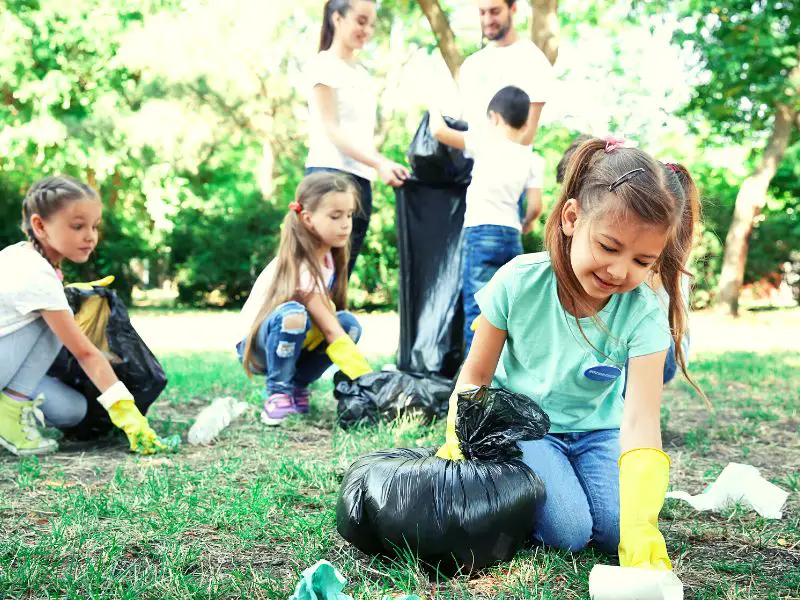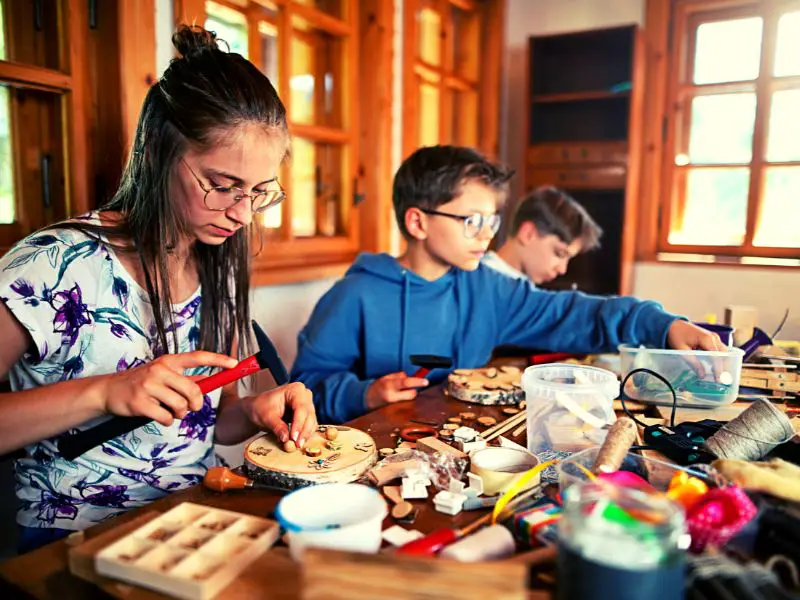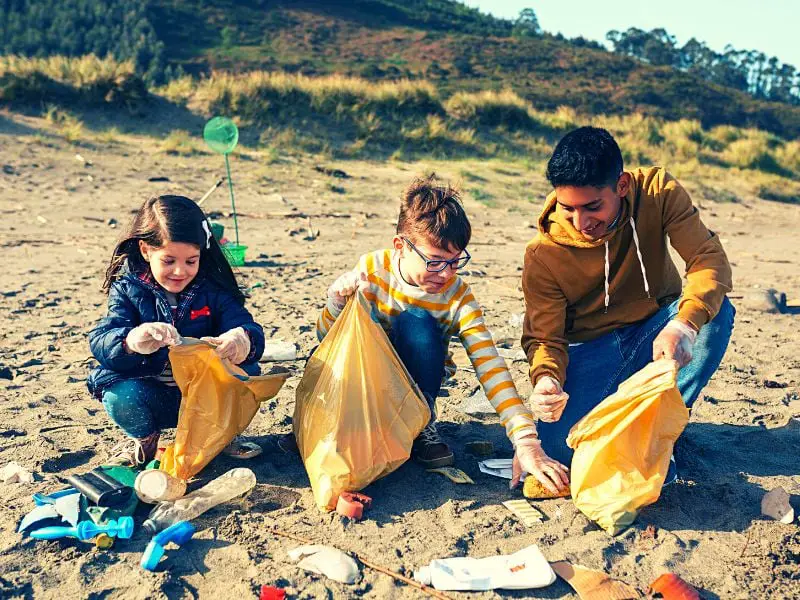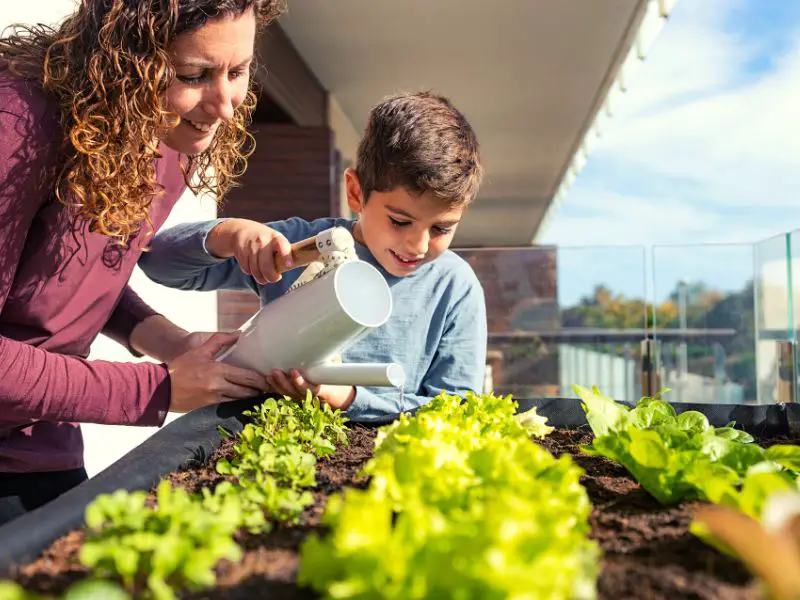We must encourage our children to develop a natural curiosity and enthusiasm for sustainability.
There are many ways kids can learn about the world around them without toxic chemicals, including harvesting edible plants, helping out on a poultry farm, growing a garden, or volunteering at an animal shelter.
Of course, don’t forget to continue to teach your kids about care and responsibility by offering guidance when needed. Sure, there are many ways to learn about the world around them without toxic chemicals. But they need rules to follow, and they will remember those rules by observing. By demonstrating what not to do, you can help your child understand how to behave in the future. This will make a big difference over time.
Children must learn from your example, but there are tons of fun activities for them to participate in! But before jumping on the different things you can do with your kids to learn more about sustainability, let’s know its importance.

What’s the Importance of Teaching Sustainability to Kids?
Before we get into the different ways you may get your child’s relationship with the environment off to an excellent start, let’s talk about why it’s so important.
Spending time in the great outdoors will teach children to be more purposeful and active, and it will also improve their health. It also has an influential impact on how they perceive their surroundings.
As adults, we are well aware of the hazards our species and our planet are subjected to. Climate change and general pollution are two issues that we are concerned about. For their part, children must see and feel firsthand how these things affect people. And the reason why these problems are ever in existence in the first place.
By instilling a sense of sustainability in children now, you can prepare them for the future. You are laying the groundwork for kids to become ethical and environmentally conscious persons later on. When it comes down to it, nothing is more important. And when kids grow up, they likely make a more positive contribution to the world around them.
Sustainability is more than just a buzzword. It’s more like an ultimate goal for all species to strive for. Sustainability means living in ways that we can maintain for the long term and giving back to that which supports us as a species today and into the future.
So, how do we accomplish this in a way that kids will appreciate?
Kids Learn Easier With Games
Children learn to communicate and express themselves through play, one of the first types of communication and expression they know.
From the moment they are born, we begin playing games with them such as “peek-a-boo” and “copy-cat” to help them learn critical developmental skills while also practicing bonding.
This is important for children’s emotional, mental, and physical development. By playing with them, we contribute to their overall health and well-being.

So, what are some ways that play might help children develop? Here are four fundamental reasons why play-based learning is so important:
- Promote imagination and creativity.
- Introduce the world around them.
- Improve their cognitive abilities.
- Teaches cooperation and understanding.
Games are all about exploration, learning, and discovery. It is a way for children to figure out how the world works, understand what it means to be healthy, and understand the potential benefits of being environmentally friendly.
Sustainable Activities to Do With the Kids Routinely
So we’ve demonstrated that play is the key to unlocking understanding for children.
But what are some concrete steps that parents may take to incorporate the essential concepts of sustainability into their children’s daily lives?
Here are seven approaches to get you started:
1. Pick Up Litter
The presence of litter everywhere can quickly be taken for granted. After all, it has become such a standard part of our everyday lives. Fortunately, you can use this to teach the kids about the importance of recycling.
While traveling around town, look for a liter at the end of driveways, parks, streets, and sidewalks. The next time you spot a litter nearby, tell your kids, “Look! Liter! Let’s clean it up!” If they are old enough to walk around with you, have them pick up plastic bottles or pop cans and bring them to you so that you can throw them away correctly.

Consider purchasing a litter-collection bag for each of your children, which they will receive a reward for when it is full. Picking up litter is an essential practice for everyone in the world.
2. Sort and Recycle
It’s good practice to help teach your child how to sort their garbage and recycle whatever is possible.
Once you have sorted their garbage, have them help you deposit it into the appropriate bins. The most important thing is to start your kids out young so that it becomes a habit for them in the future.
Having a lot of different cans for different types of recycling can help your kids “gamify” recycling. It can also help kids better understand the different kinds of recycling. If you can get your kids to recycle regularly, they’re more likely to continue doing so as they grow older.
3. Be a Volunteer
Volunteering is one of the best ways to get your kids involved in their community. Because it lets them learn about sustainability, volunteerism is a great way to introduce the concept of volunteering to children at an early age.
If you are lucky enough to live in a community that does offer some volunteer opportunities for kids, take advantage of it! And if not, consider creating one yourself with your neighbors! (Remember, it all starts with what people accomplish when helping others.)
Volunteering for community service projects such as park cleanup helps instill in your children a sense of pride and confidence in living in a clean neighborhood while also safeguarding the environment.
4. Teach the Kids to Value Water
Water is one of the most precious resources on our planet. It is essential to human survival and sustaining life as we know it. Because of this, we must instill in our children the value of water and make them aware of the importance of conserving it.

You may promote awareness at home by making modest gestures and engaging in environmentally friendly activities such as shutting off the faucet while brushing teeth, having a bath instead of a shower, and refraining from engaging in any activity while the tap is running.
Installing water meters and holding a monthly “contest” to see whether your family can spend less water than the previous month will assist you in tracking your water consumption. Then if they have been conserving water and you see improvement in your water expenses, you can reward them with a trip to one of their favorite restaurants or something memorable.
5. Resell or Donate Used Items
Have your children outgrown their clothes? Or do the kids have a ton of outdated toys that are no longer in use? Instead of tossing perfectly lovely, lightly used items into the trash, you have the option of teaching your children either philanthropic or business principles.
It is an opportunity to teach our kids how to market gently used products if they have unneeded items, such as pricey apparel, art, furniture, or electronics.
6. Make Recycled Crafts Together
Recycling the materials to make crafts with is a great way to encourage your kids to be environmentally conscious. It’s also a perfect way for them to learn about how recycling works.
Making recycled crafts can also include using throwaway items like coffee filters and paper rolls in wonderfully creative and recycled projects. And every time they make one, they will have learned something new!
7. Plant a Garden
Assigning children the task of caring for a small garden might help them develop valuable accountability skills. Furthermore, it has the potential to pique your kid’s interest in permaculture.
Growing vegetables at home is a valuable life skill that children can use for the rest of their lives. In addition, it promotes the development of good eating habits. Achieving this is particularly crucial in a world where sugary foods make up a significant portion of many people’s diets. These foods have the potential to be detrimental to one’s health. It is, therefore, crucial to teach children how to eat healthfully from an early age.

Apart from teaching life skills and fostering healthy eating habits, producing vegetables is a tactile and immersive enjoyable hobby for the whole family.
Author’s Note
As you can see, this list encompasses diverse and exciting ways to teach children. Every activity has the potential to provide exposure to new skill sets that are instrumental in ensuring their future success. Every topic teaches something: etiquette in social situations, self-respect through volunteering, corporate responsibility by cleaning the environment, math strategy by playing games with our kids—to name just a few.
These activities are enjoyable because they offer challenges plus a sense of accomplishment from finishing them successfully. And like any worthwhile endeavor in life, participating in some small way will bring happiness for both the parent and child (or grandparent!).
These eco tips below will help your kids start living a sustainable lifestyle at a young age. Teaching children the importance of sustainability is more relevant than ever these days. If you liked reading or found this post useful, please, share it with your friends on your social media platforms. Thank you!


2 thoughts on “7 Eco-Friendly Activities That Help Kids Learn About Sustainability”